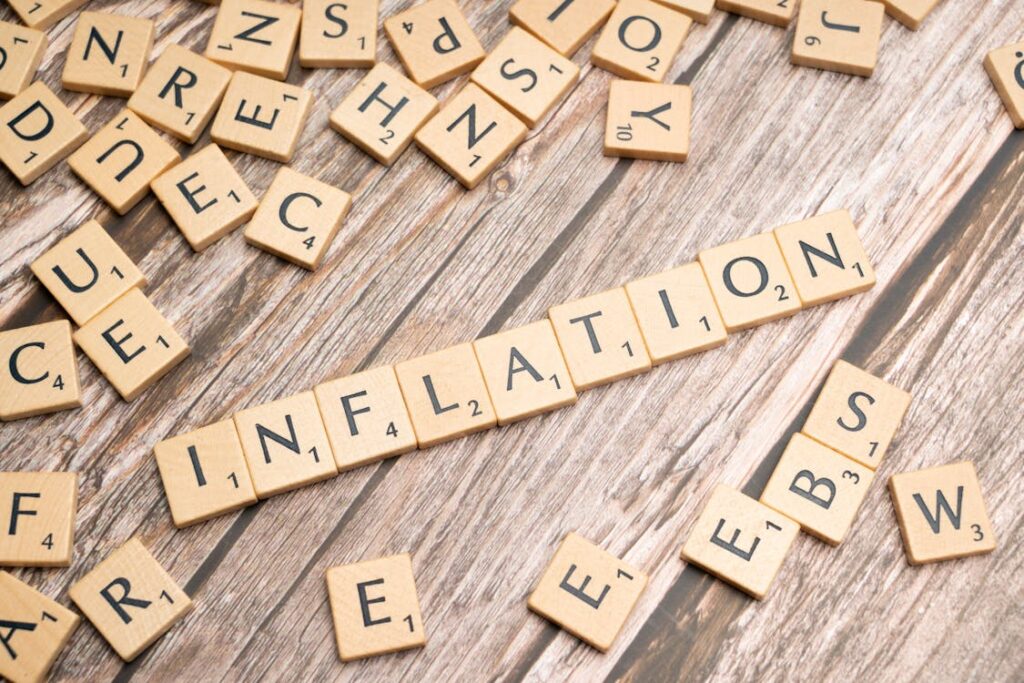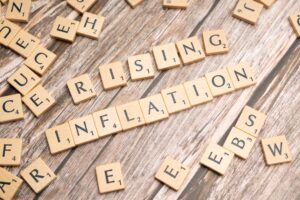
inflation
Introduction
Inflation is like an invisible tax that progressively depletes your savings without your knowledge. You may have observed that the prices of basic products, such as fuel and food, have consistently grown over the years. What used to be a small part of your budget a decade ago now consumes a considerably larger portion of your earnings. But how does inflation affect your personal money, and how can you protect yourself? This article focuses deeply into the effects of inflation, how it affects all aspects of financial life, and presents practical solutions to remain ahead..

Understanding Inflation: What It Means for You
It refers to the general rise in prices of goods and services over time, reducing the purchasing power of your money. In simple terms, what you could buy for $100 last year may now cost $110 or more. While moderate inflation is a sign of a growing economy, uncontrolled inflation can make life financially challenging. Central banks and governments often use monetary policies to regulate inflation, but these measures don’t always prevent the financial strain felt by individuals and households.
Effects of Inflation on Your Finances
Reduced Purchasing Power
It means your money does not go as far as it used to. The amount you used to spend on food items, rent, and utilities may no longer be adequate. If your salary does not keep up with inflation, you may have to cut corners to make ends meet. This impacts everything from the expense of dining out to the price of key services like healthcare and education.

Savings and Investments
If you have money in a typical savings account earning a low interest rate, inflation will progressively diminish its value. For example, if inflation is 5% and your savings account only pays 1% interest, you are basically losing money. This makes it critical to invest in assets that can outperform inflation, such as equities, real estate, or inflation-protected securities. Furthermore, inflation impacts the value of cash holdings—money that is not actively expanding will devalue with time, making it necessary to design an investing strategy that keeps up with rising prices.
Impact on Loans and Debt
It can benefit you if you have a fixed-rate loan. As prices rise, the value of money falls, making the amount you owe effectively cheaper over time. However, if you have a variable interest loan, your payments may increase as interest rates rise to battle inflation. Understanding this dynamic might help you develop efficient debt repayment methods. Furthermore, persons seeking to borrow money during high-inflation periods may face higher interest rates, making loans more expensive and limiting their capacity to meet critical financial responsibilities.
Retirement Planning Challenges
Imagine retiring and discovering that the money you’ve saved over the years no longer covers your expenses. If your retirement fund fails to keep up with it, your standard of living may suffer. It can reduce the purchasing power of pension payouts and fixed retirement incomes, forcing seniors to alter their spending or seek additional income. Investing in retirement funds that rise with it, is critical for ensuring a pleasant post-work life..
Housing & Real Estate
It affects real estate in a variety of ways. Property values typically rise over time, making real estate an appealing investment. However, inflation drives higher mortgage rates, raising the expense of homeownership. Renters may discover that landlords raise rents to keep up with inflation, making home affordability a rising issue. It can benefit property owners by increasing home equity, but prospective purchasers may struggle to keep up with growing prices.
Cost of Goods and Services
It has a direct impact on everyday essentials such as foodstuffs and fuel. When production and transportation costs grow, they are passed on to customers. High it can also cause “shrinking prices,” in which corporations cut product sizes while keeping prices the same, offering customers less value for their money. Being aware of such trends might help people make smarter purchase selections and manage their budgets more effectively.
How to Protect Your Finances from Inflation
- Diversify Your Investments: Putting all your money in one place is risky. Diversify across stocks, bonds, real estate, crypto(stable coins) and other inflation-resistant assets.
- Increase Your Income Streams: Don’t rely on just one source of income. Consider side hustles, freelancing, or upskilling to boost your earning potential.
- Budget and Cut Unnecessary Expenses: Track your spending and eliminate wasteful expenditures. This ensures you have more money allocated to essentials and investments.
- Invest in Inflation-Protected Securities: Consider assets like Treasury Inflation-Protected Securities (TIPS) and other investments that adjust with it.
- Negotiate Salary Increases: If your salary isn’t keeping up with inflation, it’s time to negotiate. Employers understand the rising cost of living, and you deserve fair compensation.
- Real Estate as a Hedge: If you can afford it, real estate can be a strong inflation hedge. Property values tend to appreciate over time, and rental properties can provide a steady income stream.
- Stay Informed and Adapt: Keep track of economic trends and be flexible with your financial strategies. Understanding inflationary trends can help you make proactive decisions rather than reactive ones.
Conclusion
Inflation is unavoidable, but being unprepared is not. By adopting proactive efforts, you can prevent rising prices from jeopardizing your financial stability. Staying informed and adaptive is essential for making sound financial decisions and increasing your income. Inflation might be difficult, but with the correct technique, you can turn it into an opportunity for financial gain. The idea is to plan ahead, make modifications as needed, and seek ongoing financial education.
Being financially prepared involves having a plan in place to protect your money from the effects of it. Whether through diverse assets, income growth, or prudent spending, taking action now can protect your future financial well-being.





